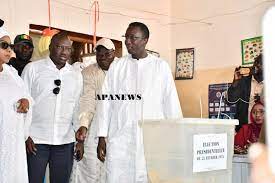APA-Dakar (Senegal) The candidate of the ruling coalition made this statement on the evening of polling day Sunday.
Following the vote, Senegalese citizens are anxious to know the provisional results, which will be announced by the National Commission for the Inventory of Votes.
By Sunday evening several candidates sent their “congratulations” to poll rival Bassirou Diomaye Faye, whom they
consider to be the winner of the presidential election.
Against this backdrop, Ba, the candidate of the ruling Benno Bokk Yaakaar (United in Hope) coalition, issued a statement at the headquarters of the ‘Alliance pour la Republique’ (APR) in Dakar, hailing the “maturity” of the Senegalese people.
The former Prime Minister then called for respect for the “laws of the Republic,” the “democratic game” and the “verdict of the ballot box,” adding that his teams were working on the results and that he would be
returning to his supporters on Monday 25 March to pass on his message.
Incumbent president Macky Sall, speaking from Fatick (center), where he had voted, called on all those involved to refrain from announcing any results, which is the responsibility of the National Commission for the Enumeration of Votes.
Millions of Senegalese went to the polls to choose his successor, in an electoral process marked by some twists
and turns.
Initially scheduled for 25 February, the presidential election was postponed for the first time to 15 December following a decision by the National Assembly, at the request of the Senegalese Democratic Party (PDS). This political group’s candidate, Karim Wade, was rejected by the constitutional court.
Accusing two constitutional court judges of corruption, the liberals then obtained, with the support of a majority of MPs, the setting up of a parliamentary commission of enquiry on 31 January, and on 5 February pushed through a law postponing the election.
After 16 of the 19 candidates appealed to the constitutional court, the latter cancelled the postponement of the election and asked the Senegalese leader to set a new date “as soon as possible.”
Macky Sall undertook to respect this decision and called for wide-ranging consultations, leading to the proposal of 2 June 2024 as the new date, as well as an extension of his term of office until his successor is installed.
However, these proposals were rejected by the constitutional court on 6th March.
In the same vein, the high court set the election date at 31 March, even though President Sall had already informed his government that the ballot would take place on 24 March.
In the end, the judges followed the decision of the Senegalese head of state.
The PDS had challenged before the supreme court the presidential decrees calling the election on 24 March and setting the campaign period at 15 days.
However, the court did not rule in favour of the party of Senegal’s former President Abdoulaye Wade, who ultimately voiced support for Bassirou Diomaye Faye.
The Economic Community of West African States, the European Union and civil society organisations deployed hundreds of observers throughout Senegal to monitor the poll.
AC/fss/as/APA


